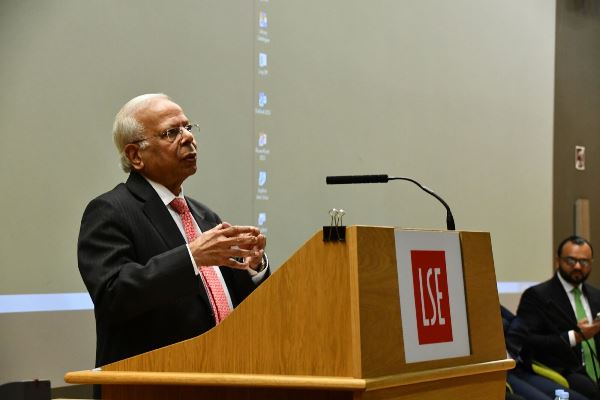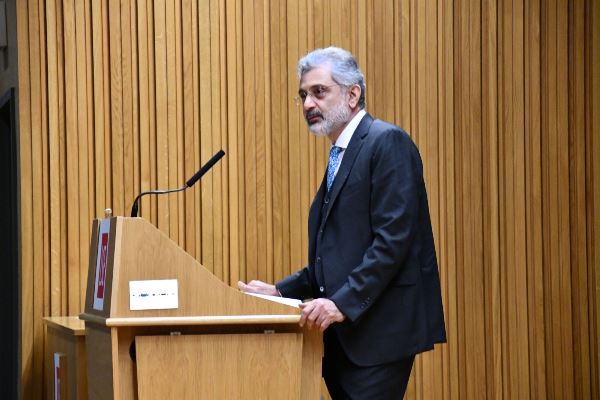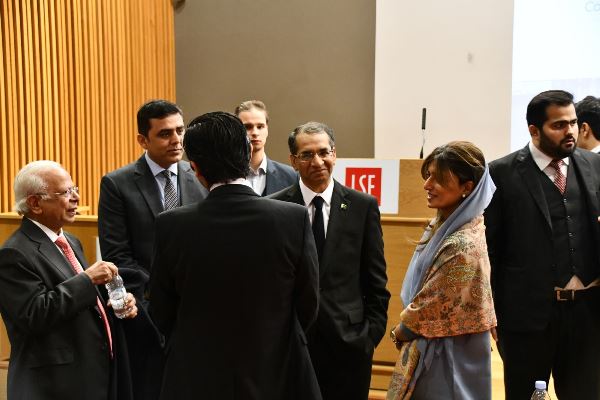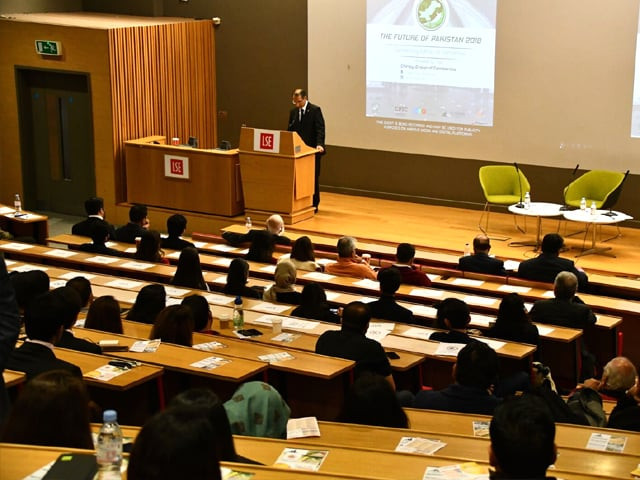“Judges, like all other officers of the state of Pakistan, are public servants and are accountable to the people.”
This was a comment by Supreme Court Justice Qazi Faez Isa at the London School of Economics (LSE) on November 3rd, in front of a packed audience consisting of Pakistani and non-Pakistani students across the UK. Other speakers of note, ranging from the Prime Minister’s Special Economic Adviser Dr Ishrat Hussain to former Foreign Minister Hina Rabbani Khar, echoed this sentiment.
The narrative of public accountability in Pakistan – both a goal and an ideal – is one we must aspire towards domestically and project internationally. At LSE, we worked towards achieving the latter.
As President of the South Asia Society and Vice President of the Pakistan Development Society at LSE, I considered it an honour to contribute towards organising the Future of Pakistan Conference (FOPC) in collaboration with the Queen Mary Pakistan Society. This is the largest student-run conference on Pakistan in the world, and the annual flagship event of the LSE Pakistan Development Society.
LSE is a world-renowned institution known for the value it adds to productive discourse, the development of research agendas, and the growth of ideas. The FOPC is also the largest student-led international conference in Europe, allowing a unique opportunity for Pakistani students at LSE, as well as those students and academics interested in Pakistan, to engage with Pakistan’s political leadership in an academic setting.
Last year, we had the great privilege of hosting former prime minister Shahid Khaqan Abbasi. The former premier addressed the conference and engaged with LSE students, in discussion with LSE Director Dame Minouche Shafik. The event was the encapsulation of our societal aspirations, allowing students direct access to global leaders and policy makers, while having constructive and productive discourse on the various challenges faced by Pakistan as well as creating greater awareness about Pakistan’s development in the wider non-Pakistani community. The last conference also hosted politicians such as Senator Sherry Rehman, Senator Abdul Qayyum, Dr Miftah Ismail and Qamar Zaman Kaira, along with journalists such as Cyril Almeida and Aamir Ghauri, amongst many others.
This year’s discussions led to important conclusions, driven by our mechanism of fearless student engagement. The first conclusion was the rift between the civil and military arms of the state on engagements with political movements. I questioned the panel as to why the state had treated two protest movements – the Tehreek-e-Labbaik Pakistan (TLP) and the Pashtun Tahafuz Movement (PTM) – so differently. Khar’s response was powerful, as she sought to underline the internal contradictions within the state’s stance and publicly declared support for the PTM’s seminal objective on transparency in military operations. Meanwhile, Lt General (retd) Khalid Naeem Lodhi argued the importance of the military as a legitimate actor and hence the consequent need to deal with threats which challenge its legitimacy.
 Hina Rabbani Khar
Hina Rabbani Khar General Lodhi
General LodhiThe second conclusion was on the importance of opening up Pakistani markets to the world. In the panel on economy, I pressed Dr Hussain over the lack of structural incentives for high-skilled Pakistani students abroad – many of whom sat in the audience – to return to Pakistan. The response from him and the rest of the panel was that in order to aid brain circulation – the constant moving of talent across the world – Pakistan has to make its labour mobile and create more opportunities for foreign investment.
 Dr Hussain
Dr HussainThe final conclusion was delivered by the keynote speaker Justice Isa, who pondered over the possibility of creating a culture of accountability. The narrative, he said, must be one where all officials of the state are seen as servants and not masters of the people. Most importantly, he highlighted officials in the state who had dutifully performed their service, most notably Justice Syeda Tahira Safdar, the first female Chief Justice of the Balochistan High Court, and Dr Shehla Sami, a first responder to the brutal attacks in Quetta. The message was implicit but clear: we are hopeless as a nation without our women, and providing structural opportunities and freedom to them was the only means to push forward into an era of progress.
 Justice Isa
Justice IsaOf course, this conference was a display of Pakistan to the international community at the LSE. As the speakers remarked at last year’s conference, it demonstrates,
“A lot of appetite for Pakistani narrative on the international stage. We often fail to put across our story, as we do not calibrate our response to the emerging international and regional politics and do not leverage available platforms.”
At the same time, it has demonstrated the need for more research and more accessibility to said research on Pakistan. This research could not only provide the empirical foundations for development reform in the country, but also further clarify and add nuance to the development agenda as displayed to the rest of the world. The common narrative from all panellists across the spectrum seemed to be that,
“There is a need for the Pakistani government and more so the Pakistani corporate sector to identify such opportunities and increase engagement with international research and academic community.”
 The speakers at the conference
The speakers at the conferenceAn important cog in this progress is for students such as myself and those in universities across the world to advance the narrative that Pakistan is worthy and capable of positive change, and for the international community to work with Pakistan towards this change. At the LSE, we hope to continue connecting Pakistan to the rest of the world to make such change possible.
All photos: Hamza Tariq



COMMENTS
Comments are moderated and generally will be posted if they are on-topic and not abusive.
For more information, please see our Comments FAQ